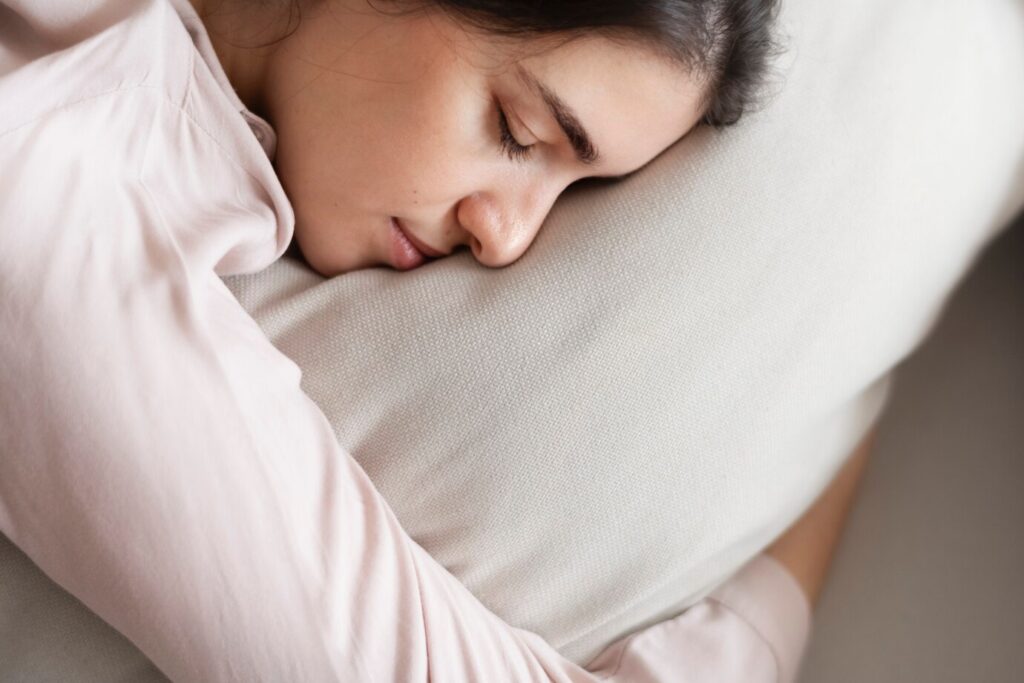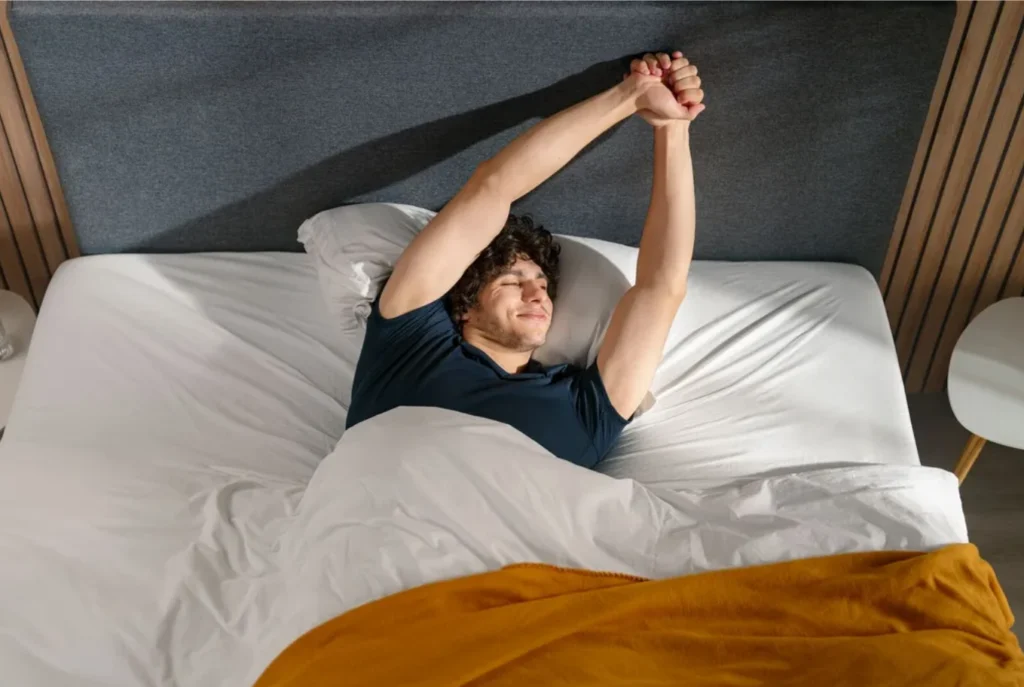Sleep might not always seem like the most exciting part of your day, but it plays a critical role in your physical and mental health, work performance, and relationships. So, how much sleep do you really need? Let’s break it down.
Editor’s Note: This content is for informational purposes only and isn’t meant to replace professional medical advice. If you have concerns about your sleep or health, speak to a qualified healthcare provider.
The Impact of Too Little — Or Too Much — Sleep
According to the CDC, about one in three Americans don’t get enough sleep on a regular basis. And the effects of sleep deprivation are more serious than just feeling groggy.
Lack of Sleep Can Lead To:
-
Daytime fatigue
-
Memory issues
-
Impaired concentration
-
Increased risk of diabetes, heart disease, and obesity
-
Mood disorders, including depression
-
Decreased libido
-
Slower reaction times (dangerous while driving!)
-
Poor judgment
-
Skin issues
-
Workplace mistakes
On the flip side, sleeping too much isn’t great either.
A major study published in the European Heart Journal tracked the sleep habits of over 116,000 people across 21 countries. After nearly 8 years, researchers found that:
-
Those who slept 6–8 hours/night had the lowest risk of cardiovascular events (7.8 per 1,000 people)
-
Sleeping 8–9 hours raised the risk slightly (8.4/1,000)
-
9–10 hours: 10.4/1,000
-
Over 10 hours: 14.8/1,000
-
Sleeping less than 6 hours also increased risk (9.4/1,000)
This study was observational, so more research is needed to fully understand the “why,” but the takeaway is clear: balance is key.
Sleep Recommendations by Age
Sleep needs vary by age and lifestyle. Here’s a quick guide to help you figure out what’s best for your stage of life:
Pregnant People
There’s no single sleep requirement during pregnancy, but rest is especially important. Studies suggest that poor sleep while pregnant may increase the risk of:
-
Cesarean deliveries
-
Preterm labor
-
Heightened pain perception during labor
Sleepiness in pregnancy can be due to hormonal shifts (like increased progesterone), low blood pressure, or low blood sugar.
📌 General recommendation: 7–9 hours per night, plus naps if needed.
Newborns (0–3 months)
Newborns need 14–17 hours of sleep per day—but they get it in short bursts due to frequent feedings every 2–5 hours.
Expect restlessness and frequent stirring—it’s normal during this REM-heavy stage of development.
Infants (4–12 months)
Babies this age typically need 12–16 hours, including naps. By 3–6 months, many can sleep through the night, but sleep regressions can happen.
Tip: Be patient through sleep regressions—they’re often tied to developmental stages or separation anxiety.
Teenagers
Most teens only get about 7–7.25 hours per night—but they need 8–10 hours.
Why the disconnect? Teen circadian rhythms naturally shift later, but early school start times don’t help. Overscheduling and screen time also take a toll.
Sleep-deprived teens are at higher risk for:
-
Depression
-
Poor academic performance
-
Anxiety
-
Drowsy driving
-
Risky behavior
College Students
College life can wreck sleep schedules. Between studying, social life, and noisy dorms, students average just 6–6.9 hours per night—short of the CDC’s recommended 7+ hours.
Sleep affects GPA, mood, immune function, and more.
Older Adults (65+)
Sleep patterns often shift with age. Seniors might fall asleep and wake up earlier, or experience lighter sleep. That said, they still need around 7–8 hours per night.
Sleep troubles may stem from:
-
Reduced melatonin production
-
Medical conditions
-
Medication side effects
Are You Getting Enough Sleep?
You might be sleep-deprived if you regularly:
-
Nod off during the day
-
Feel irritable or moody
-
Struggle to focus or remember things
-
Feel sluggish or unmotivated
-
Make more mistakes than usual
-
Crave carbs and sugar
As ER nurse James Cobb puts it: “If you’re struggling to learn, heal, or feel like yourself emotionally, lack of sleep could be the root cause.”
Ways to Track Your Sleep
If you’re curious about your sleep habits, here are a few ways to monitor them:
-
Wearables (smartwatches, fitness trackers): Measure sleep through heart rate and movement, but accuracy varies.
-
Sleep apps (like SleepCycle): Use phone sensors to track your movements, but results may not be precise.
-
Smart beds and pillows (like Zeeq or SleepScore): Track sleep without needing to wear anything.
-
Sleep diaries: A notebook or phone note can help you log sleep/wake times and how you feel each morning.
Common Sleep Disruptors
People lose sleep for all kinds of reasons, including:
-
Sleep disorders (like apnea or restless leg syndrome)
-
Chronic stress or anxiety
-
Caffeine or energy drinks, especially late in the day
-
Too much screen time before bed
-
Uncomfortable bedding or room temperature
-
Noise pollution or bright lights
-
Shift work or long hours
Who Can Help With Sleep Issues?
If sleep problems persist, don’t go it alone.
🩺 Doctors
They can refer you to a sleep specialist and order a sleep study (polysomnogram) if conditions like sleep apnea are suspected.
🧠 Mental Health Professionals
Therapists or psychiatrists can help with sleep disturbances tied to anxiety, depression, or trauma.
🛏 Sleep Coaches
They aren’t medical experts, but they can help tweak your habits and routine. Pediatric sleep consultants exist too—for little ones with bedtime battles.
Creating a Sleep-Friendly Bedroom
Turn your room into a sanctuary for rest with these tips:
1. Stick to a Nighttime Routine
Wind down with soothing habits like a warm bath, reading, or meditation. Aim for a consistent bedtime and wake time—even on weekends.
2. Upgrade Your Bed
A supportive mattress, cozy bedding, and the right pillow can make all the difference. If your mattress is over 7 years old or causes pain, it’s time for a change.
3. Set the Right Ambience
-
Light: Block it out with blackout curtains or an eye mask.
-
Temperature: Keep it cool—typically 60–67°F (15–19°C) is ideal.
-
Noise: Try earplugs, white noise machines, or calming audio like sleep meditations.
4. Avoid Stimulants Before Bed
Skip caffeine, heavy meals, and screen time in the hours leading up to sleep. Blue light blocks melatonin—the hormone that helps you fall asleep.
So… How Much Sleep Do You Really Need?
It depends on your age, lifestyle, and overall health. But in general:
-
Adults: 7–9 hours
-
Teens: 8–10 hours
-
Kids & Babies: More, depending on age
If you’re yawning all day, snapping at your loved ones, or blanking out mid-meeting, your body is waving a red flag. Listen to it. Sleep isn’t just downtime—it’s vital time.



